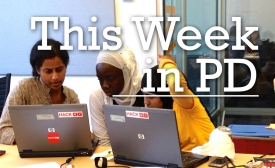Digital Diplomacy & New Technology
The internet builds on and enlarges networks, sometimes transforming them into webs of knowledge. This ultimately brings power to civil society, which gains leverage over the political decision-making process, and at times this even translates into how governments decide to shape their international alliances. Thus through cyberspace, foreign policy is becoming more accessible to the individual.
People can now send a note to President Obama by messaging the White House on Facebook. [...] “It’s about creating opportunities for people to engage with their government in new and accessible ways, using the same technologies we already rely on in our daily lives,” Goldman said.

Explore the intersection of digital media and public diplomacy in this PD News roundup.
The Obama administration has revamped a program designed to lure foreign fighters away from extremist groups like the Islamic State, focusing on a series of new advertisements and social media posts that seek to appeal to emotion rather than logic. Money for the program, which is managed by the State Department’s Global Engagement Center, tripled this year, to $16 million, after administration officials concluded that past efforts that had attempted to scare potential militants away from the extremist groups were not working.
European powers are trying to develop better means for pre-emptively spotting "lone-wolf" militants from their online activities and are looking to Israeli-developed technologies, a senior EU security official said on Tuesday.







